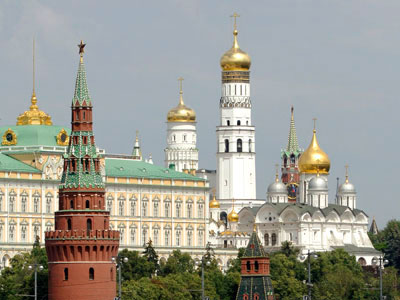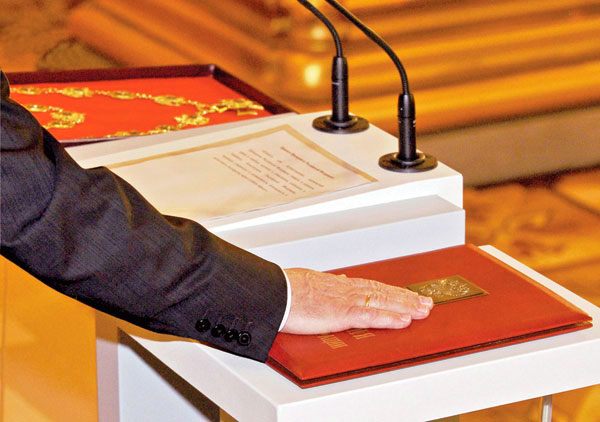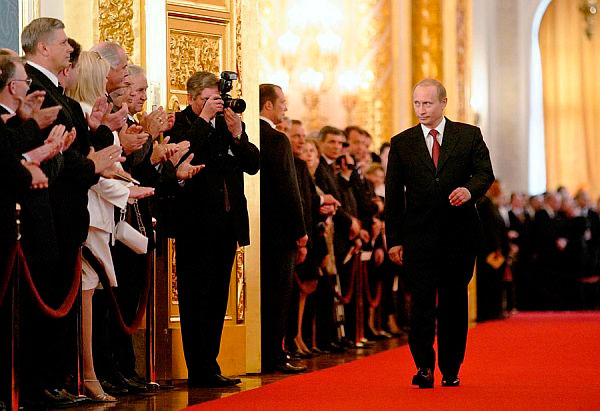
A Presidential Affair: Inauguration
/ Главная / Russkiy Mir Foundation / Publications / A Presidential Affair: InaugurationA Presidential Affair: Inauguration

Pursuant to the law On Presidential Elections in the Russian Federation, the inauguration is held on the 30th day after the Central Election Committee announces official voting results. The ceremony of the president-elect’s inauguration was developed by the Heraldic Union under the Russian President.
Tradition
The ceremony is not detailed in the law on presidential elections, but there is certain tradition.
The ceremony should be attended by:
• Members of the Federation Council,
• State Duma deputies (MPs),
• Judges of the Constitution Court,
• Heads of diplomatic missions,
• Members of the Russian Cabinet and representatives of federal authorities,
• Diplomats.
The ceremony begins with the presidential orchestra playing solemn music in the Big Kremlin Palace. Standard-bearers march through St. George and Alexander Halls to the St. Andrew Hall, carrying the National Flag of Russia, President’s Banner, Constitution and the insignia of Russian President. The chairman of the Constitution Court mounts the podium, followed by chairmen of both parliamentary chambers, and places the Constitution and presidential insignia on the pulpit where the head of state will take the oath of office.
At 11:55 the president-elect, accompanied by a motorcade, arrives in the Big Kremlin Palace via Spassky Gate. With the first chime of the Kremlin Clock the president-elect proceeds through the St. George and Alexander Halls and mounts the podium. The chairman of the Constitution Court invites the president-elect to take the oath.
Presidential oath

President assuming his office lays his right hand on the Russian Constitution and utters the presidential oath of loyalty:
“I swear in exercising the powers of the President of the Russian Federation to respect and safeguard the rights and freedoms of man and citizen, to observe and protect the Constitution of the Russian Federation, to protect the sovereignty and independence, security and integrity of the State, to faithfully serve the people”.
After that chairman of the Constitution Court hands over the emblems of power to the new head of state and announces that the new president has assumed his office. The National Anthem is then played and the Banner of the Head of State is hoisted over the cupola of presidential residence in the Kremlin.
Finally president goes out to the Cathedral Square from the doors of Holy Seni, descends the staircase of the Big Kremlin Palace and proceeds to another pulpit, from where he receives the parade of the presidential regiment. In 2004 horsemen for the first time demonstrated their craftsmanship: 21 riders wearing the blue uniform and historic busbies, going back to the times of Patriotic war 1812, paraded on their bays in front of the head of state. A 30-salvo artillery salute traditionally crowns the ceremony.
The Russian president’s salary
The pecuniary allowance of the Russian President (including the salary) is a special entry in the Russian federal budget passed by the State Duma.
On October 20, 2011, the Central Election Committee published information about the personal income of candidates to the State Duma from United Russia, including Dmitry Medvedev. Mr. Medvedev earned more than 3.37 million rubles in 2011.

Journalists from The Financial Times noted that the wages of the Russian President is almost four times lower than the annual pay of his US colleague Barack Obama – $400,000 or roughly 12 million rubles.
In addition, the British journalists found that the salaries of Dmitry Medvedev and Vladimir Putin are lower than those of the West European leaders. Prime-Minister of Ireland Brian Cowen earns 257,000 EUR while French President Nicolas Sarkozy (now Francois Hollande) makes 240,000 EUR. They are followed by German Chancellor Angela Merkel with the salary of 228,000 EUR and by British Premier Gordon Brown (now David Cameron) who receives 199,000 EUR.
How wealthy is Vladimir Putin?
Information about Vladimir Putin’s revenues and property were published in December, when he became a candidate to the post of Russian President.
Pursuant to CEC Resolution #78/618-6 “On Registration of Vladimir V. Putin as Candidate to the Post of Russian President” as of December 20, 2011 that also contained information about the candidate’s sources of revenues and their total, Putin’s income for four years amounted to 17,743,755 rubles.
The main sources include the salary (which he received as Head of Cabinet and Head of State), interest on his bank deposits, military pension and interest on his shares.
As reported by CEC, Vladimir Putin has 10 bank accounts where the total of 5,722,551.7 million is deposited. He also owns a 1500-sqm plot of land in the Moscow Region, a 77.7-sqm flat in Saint Petersburg, and a garage in St. Petersburg. Mr Putin also possesses leasehold to a 153.7-sqm apartment in Moscow and another garage in Saint Petersburg.
What is more, Vladimir Putin owns GAZ M21 and GAZ M21P automobiles (made in 1960 and 1965, respectively), a Lada 21214 car (2009) and a Skif trailer (1987).
New publications

 Mikhail Kalatozov, a director who transformed the world of cinematography in many ways, was born 120 years ago. He was a Soviet film official and a propagandist. Above all, he was capable of producing movies that struck viewers with their power and poetic language.
Mikhail Kalatozov, a director who transformed the world of cinematography in many ways, was born 120 years ago. He was a Soviet film official and a propagandist. Above all, he was capable of producing movies that struck viewers with their power and poetic language.  Ukrainian authorities have launched a persecution campaign against the canonical Ukrainian Orthodox Church (UOC), the biggest one in the country's modern history. Over the past year, state sanctions were imposed on clergy representatives, searches were conducted in churches, clergymen were arrested, criminal cases were initiated, the activity of the UOC was banned in various regions of the country, and monasteries and churches were seized.
Ukrainian authorities have launched a persecution campaign against the canonical Ukrainian Orthodox Church (UOC), the biggest one in the country's modern history. Over the past year, state sanctions were imposed on clergy representatives, searches were conducted in churches, clergymen were arrested, criminal cases were initiated, the activity of the UOC was banned in various regions of the country, and monasteries and churches were seized.  When Nektary Kotlyaroff, a fourth-generation Russian Australian and founder of the Russian Orthodox Choir in Sydney, first visited Russia, the first person he spoke to was a cab driver at the airport. Having heard that Nektariy's ancestors left Russia more than 100 years ago, the driver was astonished, "How come you haven't forgotten the Russian language?" Nektary Kotlyaroff repeated his answer in an interview with the Russkiy Mir. His affinity to the Orthodox Church (many of his ancestors and relatives were priests) and the traditions of a large Russian family brought from Russia helped him to preserve the Russian language.
When Nektary Kotlyaroff, a fourth-generation Russian Australian and founder of the Russian Orthodox Choir in Sydney, first visited Russia, the first person he spoke to was a cab driver at the airport. Having heard that Nektariy's ancestors left Russia more than 100 years ago, the driver was astonished, "How come you haven't forgotten the Russian language?" Nektary Kotlyaroff repeated his answer in an interview with the Russkiy Mir. His affinity to the Orthodox Church (many of his ancestors and relatives were priests) and the traditions of a large Russian family brought from Russia helped him to preserve the Russian language.

 The leaders of the Friends of the Great Russia cultural association (Amici Della Grande Russia) in Italy believe that the Western policy of abolishing Russian culture in Europe has finally failed. Furthermore, it was doomed to failure from the beginning.
The leaders of the Friends of the Great Russia cultural association (Amici Della Grande Russia) in Italy believe that the Western policy of abolishing Russian culture in Europe has finally failed. Furthermore, it was doomed to failure from the beginning.  Name of Vladimir Nemirovich-Danchenko is inscribed in the history of Russian theater along with Konstantin Stanislavski, the other founding father of the Moscow Art Theater. Nevertheless, Mr. Nemirovich-Danchenko was a renowned writer, playwright, and theater teacher even before their famous meeting in the Slavic Bazaar restaurant. Furthermore, it was Mr. Nemirovich-Danchenko who came up with the idea of establishing a new "people's" theater believing that the theater could become a "department of public education."
Name of Vladimir Nemirovich-Danchenko is inscribed in the history of Russian theater along with Konstantin Stanislavski, the other founding father of the Moscow Art Theater. Nevertheless, Mr. Nemirovich-Danchenko was a renowned writer, playwright, and theater teacher even before their famous meeting in the Slavic Bazaar restaurant. Furthermore, it was Mr. Nemirovich-Danchenko who came up with the idea of establishing a new "people's" theater believing that the theater could become a "department of public education."  "Russia is a thing of which the intellect cannot conceive..." by Fyodor Tyutchev are famous among Russians at least. December marks the 220th anniversary of the poet's birth. Yet, he never considered poetry to be his life's mission and was preoccupied with matters of a global scale. Mr.Tyutchev fought his war focusing on relations between Russia and the West, the origins of mutual misunderstanding, and the origins of Russophobia. When you read his works today, it feels as though he saw things coming in a crystal ball...
"Russia is a thing of which the intellect cannot conceive..." by Fyodor Tyutchev are famous among Russians at least. December marks the 220th anniversary of the poet's birth. Yet, he never considered poetry to be his life's mission and was preoccupied with matters of a global scale. Mr.Tyutchev fought his war focusing on relations between Russia and the West, the origins of mutual misunderstanding, and the origins of Russophobia. When you read his works today, it feels as though he saw things coming in a crystal ball...